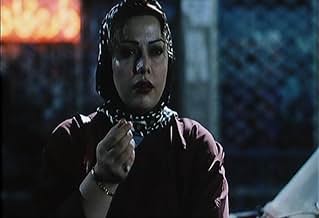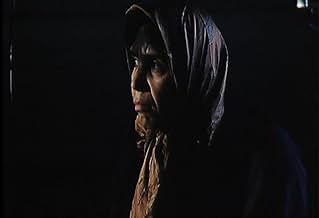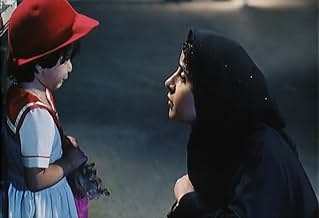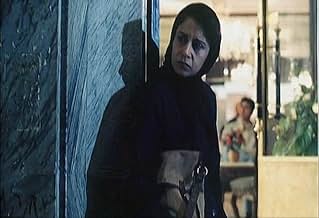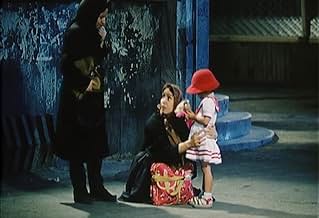AVALIAÇÃO DA IMDb
7,4/10
7 mil
SUA AVALIAÇÃO
Várias mulheres lutam para funcionar na sociedade opressivamente sexista do Irã contemporâneo.Várias mulheres lutam para funcionar na sociedade opressivamente sexista do Irã contemporâneo.Várias mulheres lutam para funcionar na sociedade opressivamente sexista do Irã contemporâneo.
- Direção
- Roteiristas
- Artistas
- Prêmios
- 12 vitórias e 7 indicações no total
Maryiam Palvin Almani
- Maryam Parvin Almani (Arezou)
- (as Maryam Parvin Almani)
Fereshteh Sadre Orafaiy
- Fereshteh (Pari)
- (as Fereshteh Sadr Orafai)
- Direção
- Roteiristas
- Elenco e equipe completos
- Produção, bilheteria e muito mais no IMDbPro
Avaliações em destaque
While Jafar Panahi's previous feature films dealt with children, with Dayereh he delves into the contentious issue of women's issues in a highly restrictive society, his native Iran. The film uses a narrative device that Tarantino might be proud to steal, with Panahi's camera following various women through their specific plights, often chasing them through the streets in handheld mode. At any moment, the camera may decide to follow a different character, and although the specific details of the various women's situations may differ, the oppression which is a part of their daily lives is consistently omnipresent. One feature of the film that is part and parcel of its roving camera approach is that there is very little in the way of exposition or denouement in any of the narrative threads. This however, seems to be the point of the entire exercise; in a society that treats women as a lower class of citizen, individual details and circumstances have no bearing on their ability to achieve anything without the presence or authority of a husband or father.
veryday occurrences such as the purchase of a bus ticket to the simple act of smoking a cigarette in public can (and does) result in mandatory incarceration for any woman at any time. The structure of the film gives the impression that literally any woman you might bump into on the streets of Tehran is caught in such a comprehensively prohibitive society that could lead to what could only be considered unconscionable drama in Western society.
Although there are no significant male characters in this story, Panahi uses the entire gender en masse to illustrate the peculiar double standards that have insinuated itself through the fabric of this society. Men are constantly harassing women with inappropriate lewd remarks to which there can obviously be no response to. Simultaneously, if a woman behaves in a manner anything less than perfectly virtuous, her liberty is instantly forfeit.
In one scene, a woman starts to stand up for herself against a casually tossed piece of innuendo, and the audience can do nothing except anticipate the unjust retaliation that will surely be endorsed by the dozens of common passers-by. There are certain elements of the film that no doubt owe to the nature of making a film under these conditions; extras occasionally can't avoid staring at the camera crew, but strangely enough, this gives the film a feel of documentary film-making that somehow enhances the narrative. Nevertheless, there is nothing amateurish about the acting of the principal women, all of whom behave so convincingly that the film conveys a sense of constant danger. Furthermore, this nervous energy never lets up, as we move from story to story at a speed that allows us to experience discomfort, without reaching closure until the final scene, which in itself is a cause for distress.
It is unlikely that Dayereh will ever be a very popular film, as it has many of the 'feel-bad' qualities of films such as A Time For Drunken Horses, with even less sympathetic sentimentality. On an even sadder note, Dayereh has been banned in Iran, where a film of this nature most desperately needs to reach an audience. However, this seems to be the underlying message of the film; not that there are a great many injustices against women occurring in Iran on a daily basis, but that there is no indication of how or when it will stop. Only why.
veryday occurrences such as the purchase of a bus ticket to the simple act of smoking a cigarette in public can (and does) result in mandatory incarceration for any woman at any time. The structure of the film gives the impression that literally any woman you might bump into on the streets of Tehran is caught in such a comprehensively prohibitive society that could lead to what could only be considered unconscionable drama in Western society.
Although there are no significant male characters in this story, Panahi uses the entire gender en masse to illustrate the peculiar double standards that have insinuated itself through the fabric of this society. Men are constantly harassing women with inappropriate lewd remarks to which there can obviously be no response to. Simultaneously, if a woman behaves in a manner anything less than perfectly virtuous, her liberty is instantly forfeit.
In one scene, a woman starts to stand up for herself against a casually tossed piece of innuendo, and the audience can do nothing except anticipate the unjust retaliation that will surely be endorsed by the dozens of common passers-by. There are certain elements of the film that no doubt owe to the nature of making a film under these conditions; extras occasionally can't avoid staring at the camera crew, but strangely enough, this gives the film a feel of documentary film-making that somehow enhances the narrative. Nevertheless, there is nothing amateurish about the acting of the principal women, all of whom behave so convincingly that the film conveys a sense of constant danger. Furthermore, this nervous energy never lets up, as we move from story to story at a speed that allows us to experience discomfort, without reaching closure until the final scene, which in itself is a cause for distress.
It is unlikely that Dayereh will ever be a very popular film, as it has many of the 'feel-bad' qualities of films such as A Time For Drunken Horses, with even less sympathetic sentimentality. On an even sadder note, Dayereh has been banned in Iran, where a film of this nature most desperately needs to reach an audience. However, this seems to be the underlying message of the film; not that there are a great many injustices against women occurring in Iran on a daily basis, but that there is no indication of how or when it will stop. Only why.
A baby girl is born, and the grandmother regrets for the sex of the baby. Three women are released under probation from the jail and get lost into the crowd, without courage to come back home and having no money. A woman escape from the jail to make an abort and is expelled from her own home by her family. Another woman left her daughter of about six years old alone on the street. A prostitute is arrested with her client in his car, and the man is released by the police later while the woman goes to jail. All of these individuals and disconnected situations are presented to show the repressive situation against the women in the Iranian society. In the end, like in a circle, all of them ends arrested in the jail. I am not aware of the behavior of the Iranian society with their women, but this movie portraits a horrible picture. The women are showed without freedom, depending on her husband or her family even for simple actions, like traveling in a bus. If their society works this way, how are these actresses daily treated after their performances in this movie? The camera and the direction are excellent. It is amazing the capability of the Iranian filmmakers in making simple but touching films. My vote is eight.
Title (Brazil): `O Círculo' (`The Circle')
Title (Brazil): `O Círculo' (`The Circle')
While reading the various interviews with Jafar Panahi concerning his latest film "The Circle", I noticed that he always stresses the fact that his film is not a feminist film, but a humanist film. I'm reminded of the times I've been in a political conversation with someone and they've said "I'm no feminist but..." and then said something in defense of women's rights. Well, whether he intended it or not, Panahi has made a feminist film, because after all, feminism in its most basic form has nothing to do with hating men, but is merely a desire for the fair and equal treatment of women, and equal human rights is of course a cornerstone of humanism. I'm no scholar (and that I can say in all honesty) but yes, I would say I'm a feminist. I've never been on a march, and I've never read the works of any great feminist theorists, but to the core of my soul I believe in the equal and fair treatment of women, and if that doesn't make me a feminist I don't know what does.
Of course, all this discussion about feminism wouldn't matter if "The Circle" wasn't such a strong film. Panahi's film, almost universally praised, will receive no negative criticism here either. His use of narrative (most reviews compare the narrative style to "La Ronde" [1950], but I suppose comparisons could be made with "The Phantom of Liberty" [1974] and "Slacker" [1990], for that matter) might be perceived by some rob the characters of their individuality, but of course that is part of the point. In Iran today women are all grouped together, Panahi is saying, and they are seen as no more that a collective problem for men to deal with. Ultimately, there is nothing I can say about this film that hasn't been said before, but I wanted a chance to express my appreciation for this extraordinary myself.
Of course, all this discussion about feminism wouldn't matter if "The Circle" wasn't such a strong film. Panahi's film, almost universally praised, will receive no negative criticism here either. His use of narrative (most reviews compare the narrative style to "La Ronde" [1950], but I suppose comparisons could be made with "The Phantom of Liberty" [1974] and "Slacker" [1990], for that matter) might be perceived by some rob the characters of their individuality, but of course that is part of the point. In Iran today women are all grouped together, Panahi is saying, and they are seen as no more that a collective problem for men to deal with. Ultimately, there is nothing I can say about this film that hasn't been said before, but I wanted a chance to express my appreciation for this extraordinary myself.
I have seen several Iranian films in the past few weeks thanks to a short season of the films screened in the UK by Channel 4 a channel that can rise above the level of reality television when it puts its mind to it. Having seen them in a compact space of time, I had quickly gotten it in my head that many of those screened had come to international attention and various degrees of acclaim because they were "issue" films that looked at some aspect of Iranian life with at least a semi-critical eye. However none of them came close to the sort of anger with the system that was evident throughout this film.
The plot sees several stories that weave around one another to produce a film that looks at several women, all of whom are suffering in some way or other due to the general treatment of women in Iran. As a dramatic device it doesn't totally work because too little time is spent with each character to really get to know them or get into their stories and situations, but this struck me as being the film's second aim with the first quite clearly being the injustice with which women are treated. As such, the narrative never really engaged me in terms of the people in the story, but the general picture painted was interesting enough to hold my attention and make me care for the characters generally, even if I would struggle to put names to faces.
The actresses are all pretty good and most come off pretty natural and convincing, with only the odd moment here and there not really working. They all strike a rather tragic note with each of them trying to make out the best they can in life but really oppressed in so many ways whether it is small things like not easily moving in the streets by themselves or being rejected by their families to save honour. The direction is good, with different styles used for some of the characters but done in a subtle way to the point where I didn't notice until somebody pointed it out to me.
Overall this is a good film but not a brilliant one mainly because the narrative comes secondary to the criticism of the system. However it is worth seeing mainly because, without really ranting, it holds a lot of anger at the status of Iranian women and their treatment and the injustice within the system it may not be balanced but it is interesting and engaging.
The plot sees several stories that weave around one another to produce a film that looks at several women, all of whom are suffering in some way or other due to the general treatment of women in Iran. As a dramatic device it doesn't totally work because too little time is spent with each character to really get to know them or get into their stories and situations, but this struck me as being the film's second aim with the first quite clearly being the injustice with which women are treated. As such, the narrative never really engaged me in terms of the people in the story, but the general picture painted was interesting enough to hold my attention and make me care for the characters generally, even if I would struggle to put names to faces.
The actresses are all pretty good and most come off pretty natural and convincing, with only the odd moment here and there not really working. They all strike a rather tragic note with each of them trying to make out the best they can in life but really oppressed in so many ways whether it is small things like not easily moving in the streets by themselves or being rejected by their families to save honour. The direction is good, with different styles used for some of the characters but done in a subtle way to the point where I didn't notice until somebody pointed it out to me.
Overall this is a good film but not a brilliant one mainly because the narrative comes secondary to the criticism of the system. However it is worth seeing mainly because, without really ranting, it holds a lot of anger at the status of Iranian women and their treatment and the injustice within the system it may not be balanced but it is interesting and engaging.
The "circle" in Jafar Panahi's great film is many things: the
structure of the film itself, which ends with the same image it
begins with; a location in Teheran, where a character meets a
friend in a movie theater; the circular stairs so many other
characters run up and down; the circling, hovering camera
movements that bring us face to face with the women in these
interlinked stories and the world they are caught in. Most of all,
perhaps, it is the constricting circle within which Iranian women
must live their lives, the tightly circumscribed rules and
expectations of a rigidly masculine universe. None of Panahi's
characters can escape this circle, though some try and one, at
least, believes that she can. The more experienced know the truth;
all they can do in running is map out the circumference of their
shrunken world.
It's easy to see The Circle as a film about the oppression of
women in Iran, but that would reduce it to the merely political--and
we should not forget that the film was made by an Iranian man,
and that three quarters of the Iranian electorate recently voted to
reelect President Khatami, a deeply intelligent voice for freedom
and dialogue who has had his own difficulties being heard.
Panahi's subject is far larger; a woman who grew up in an abusive
household told me that no other film had so accurately depicted
the experience of her youth, when the constraints on women's
lives were so much taken for granted that she was unaware there
was anything outside them. But those constraints are fatal. We
make our world together, through dialogue and interaction. To
deprive someone of voice and the chance to participate in that
process is to kill them, whether it is done through religious and
social sanctions or by a husband beating his wife. Panahi's
women are neither dead nor silent, even though their only
listeners are other women. Their tragedy finds echoes everywhere;
but in this film where theme and expression are so intimately
joined we, at least, can hear them.
structure of the film itself, which ends with the same image it
begins with; a location in Teheran, where a character meets a
friend in a movie theater; the circular stairs so many other
characters run up and down; the circling, hovering camera
movements that bring us face to face with the women in these
interlinked stories and the world they are caught in. Most of all,
perhaps, it is the constricting circle within which Iranian women
must live their lives, the tightly circumscribed rules and
expectations of a rigidly masculine universe. None of Panahi's
characters can escape this circle, though some try and one, at
least, believes that she can. The more experienced know the truth;
all they can do in running is map out the circumference of their
shrunken world.
It's easy to see The Circle as a film about the oppression of
women in Iran, but that would reduce it to the merely political--and
we should not forget that the film was made by an Iranian man,
and that three quarters of the Iranian electorate recently voted to
reelect President Khatami, a deeply intelligent voice for freedom
and dialogue who has had his own difficulties being heard.
Panahi's subject is far larger; a woman who grew up in an abusive
household told me that no other film had so accurately depicted
the experience of her youth, when the constraints on women's
lives were so much taken for granted that she was unaware there
was anything outside them. But those constraints are fatal. We
make our world together, through dialogue and interaction. To
deprive someone of voice and the chance to participate in that
process is to kill them, whether it is done through religious and
social sanctions or by a husband beating his wife. Panahi's
women are neither dead nor silent, even though their only
listeners are other women. Their tragedy finds echoes everywhere;
but in this film where theme and expression are so intimately
joined we, at least, can hear them.
Você sabia?
- CuriosidadesPanahi adopted a different camera style to depict each of the four main protagonists' lives. For the first, an idealistic woman he used a handheld camera. For the second woman, the camera is mounted on a constantly moving dolly. The third woman's story is told at night in darker outside, and the camera is static with pans and tight close ups. For the last, least optimistic woman both the camera and the woman are completely immobile and very little sound is used.
- ConexõesFeatured in Cinema Iran (2005)
Principais escolhas
Faça login para avaliar e ver a lista de recomendações personalizadas
- How long is The Circle?Fornecido pela Alexa
Detalhes
- Data de lançamento
- Países de origem
- Central de atendimento oficial
- Idioma
- Também conhecido como
- The Circle
- Locações de filme
- Empresas de produção
- Consulte mais créditos da empresa na IMDbPro
Bilheteria
- Orçamento
- US$ 10.000 (estimativa)
- Faturamento bruto nos EUA e Canadá
- US$ 440.554
- Faturamento bruto mundial
- US$ 756.035
Contribua para esta página
Sugerir uma alteração ou adicionar conteúdo ausente


